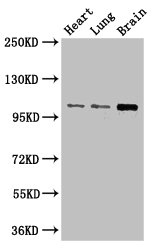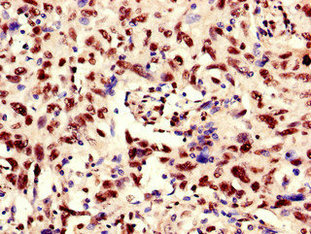RBM10 Antibody
-
货号:CSB-PA019400LA01HU
-
规格:¥440
-
促销:
-
图片:
-
Western Blot
Positive WB detected in: Mouse heart tissue, Mouse lung tissue, Mouse brain tissue
All lanes: RBM10 antibody at 3µg/ml
Secondary
Goat polyclonal to rabbit IgG at 1/50000 dilution
Predicted band size: 104, 95, 111 kDa
Observed band size: 104 kDa -
Immunohistochemistry of paraffin-embedded human lung cancer using CSB-PA019400LA01HU at dilution of 1:100
-
Immunofluorescent analysis of Hela cells using CSB-PA019400LA01HU at dilution of 1:100 and Alexa Fluor 488-congugated AffiniPure Goat Anti-Rabbit IgG(H+L)
-
-
其他:
产品详情
-
产品名称:Rabbit anti-Homo sapiens (Human) RBM10 Polyclonal antibody
-
Uniprot No.:P98175
-
基因名:
-
别名:DXS8237E antibody; G patch domain containing protein 9 antibody; G patch domain-containing protein 9 antibody; GPATC9 antibody; GPATCH9 antibody; HGNC9896 antibody; KIAA0122 antibody; MGC1132 antibody; MGC997 antibody; Rbm10 antibody; RBM10_HUMAN antibody; RNA binding motif protein 10 antibody; RNA binding protein 10 antibody; RNA binding protein S1-1 antibody; RNA-binding motif protein 10 antibody; RNA-binding protein 10 antibody; RNA-binding protein S1-1 antibody; S1-1 antibody; TARPS antibody; ZRANB5 antibody
-
宿主:Rabbit
-
反应种属:Human, Mouse
-
免疫原:Recombinant Human RNA-binding protein 10 protein (501-700AA)
-
免疫原种属:Homo sapiens (Human)
-
标记方式:Non-conjugated
本页面中的产品,RBM10 Antibody (CSB-PA019400LA01HU),的标记方式是Non-conjugated。对于RBM10 Antibody,我们还提供其他标记。见下表:
-
克隆类型:Polyclonal
-
抗体亚型:IgG
-
纯化方式:>95%, Protein G purified
-
浓度:It differs from different batches. Please contact us to confirm it.
-
保存缓冲液:Preservative: 0.03% Proclin 300
Constituents: 50% Glycerol, 0.01M PBS, PH 7.4 -
产品提供形式:Liquid
-
应用范围:ELISA, WB, IHC, IF
-
推荐稀释比:
Application Recommended Dilution WB 1:2000-1:10000 IHC 1:20-1:200 IF 1:50-1:200 -
Protocols:
-
储存条件:Upon receipt, store at -20°C or -80°C. Avoid repeated freeze.
-
货期:Basically, we can dispatch the products out in 1-3 working days after receiving your orders. Delivery time maybe differs from different purchasing way or location, please kindly consult your local distributors for specific delivery time.
相关产品
靶点详情
-
功能:May be involved in post-transcriptional processing, most probably in mRNA splicing. Binds to RNA homopolymers, with a preference for poly(G) and poly(U) and little for poly(A). May bind to specific miRNA hairpins.
-
基因功能参考文献:
- RBM10: Harmful or helpful-many factors to consider. PMID: 29274279
- RBM10 mutations contribute to lung adenocarcinoma pathogenesis. PMID: 28091594
- The high rate of TERT promoter mutations, MED12 mutations, RBM10 mutations, and chromosome 1q gain highlight their likely association with tumor virulence PMID: 28634282
- The well-known high-fidelity RNA splice site recognition by RBM10, and probably by RBM5 and RBM6, can thus be largely rationalized by a cooperative binding action of RRM and ZnF domains PMID: 29450990
- Our work has not only expanded the number of pre-mRNA targets for RBM10, but identified RBM10 as a novel regulator of SMN2 alternative inclusion. PMID: 28728573
- RBM10 functions as a splicing regulator using two RNA-binding units with different specificities to promote exon skipping. PMID: 28379442
- RNA binding motif protein 10 (RBM10) negatively regulates its own mRNA and protein expression and that of RNA binding motif protein 5 (RBM5) by promoting alternative splicing-coupled nonsense-mediated mRNA decay (AS-NMD). PMID: 28586478
- results provide evidence that RBM10 expression, in RBM5-null tumors, may contribute to tumor growth and metastasis. Measurement of both RBM10 and RBM5 expression in clinical samples may therefore hold prognostic and/or potentially predictive value PMID: 28662214
- RBM10-TFE3 is a recurrent gene fusion in Xp11 translocation renal cell carcinoma. PMID: 28296677
- Xp11 translocation renal cell carcinomas with RBM10-TFE3 gene fusion demonstrating melanotic features and overlapping morphology with t(6;11) RCC. PMID: 28288037
- RNA-binding motif 10 messenger RNA and protein were reduced in lung adenocarcinoma tissues, and RNA-binding motif 10 overexpression inhibited lung adenocarcinoma cancer cell malignant behavior in vitro. Molecularly, RNA-binding motif 10 regulates many gene pathways involving in the tumor development or progression. PMID: 28347232
- RBM10-TFE3 fusion variant (from chromosome X paracentric inversion), therefore, appears to be a recurrent molecular event in Xp11.2 RCCs. RBM10-TFE3 fusion should be added in the list of screened fusion transcripts in targeted molecular diagnostic multiplex RT-PCR PMID: 26998913
- RBM10 is a tumor suppressor that represses Notch signaling and cell proliferation through the regulation of NUMB alternative splicing PMID: 26853560
- Src family tyrosine kinase signaling may regulate FilGAP through association with RBM10 PMID: 26751795
- The ability of RBM10v1 to regulate alternative splicing depends, at least in part, on a structural alteration within the second RNA recognition motif domain, and correlates with preferential expression of the NUMB exon 11 inclusion variant. PMID: 25889998
- RBM10 regulates alternative splicing of Fas and Bcl-x genes. PMID: 24530524
- Antagonizes the effects of RBM5, RBM6, and RBM10 in cell colony formation. PMID: 24332178
- This study established RBM10 as an important regulator of alternative splicing, presented a mechanistic model for RBM10-mediated splicing regulation and provided a molecular link to understanding a human congenital disorder. PMID: 24000153
- S1-1 contains multiple nuclear localisation sequence that act cooperatively. PMID: 23294349
- Massively parallel sequencing of exons on the X chromosome identifies RBM10 as the gene that causes a syndromic form of cleft palate. PMID: 20451169
- From these results, it seems that the X-chromosome, through its RBM genes, plays a formerly unknown role in the regulation of programmed cell death (apoptosis) in breast cancer. PMID: 16552754
- S1-1 constitutes hundreds of nuclear domains, which dynamically change their structures in a reversible manner; upon globally reducing RNA polymerase II transcription, S1-1 nuclear bodies enlarge and decrease in number. PMID: 18315527
- results indicate that very few genes are involved in the last steps of the apoptotic cascade in breast cancer, among them one of the X-chromosome RBM family PMID: 18820371
显示更多
收起更多
-
相关疾病:TARP syndrome (TARPS)
-
亚细胞定位:Nucleus. Note=In the extranucleolar nucleoplasm constitutes hundreds of nuclear domains, which dynamically change their structures in a reversible manner. Upon globally reducing RNA polymerase II transcription, the nuclear bodies enlarge and decrease in number. They occur closely adjacent to nuclear speckles or IGCs (interchromatin granule clusters) but coincide with TIDRs (transcription-inactivation-dependent RNA domains).
-
数据库链接:
HGNC: 9896
OMIM: 300080
KEGG: hsa:8241
STRING: 9606.ENSP00000366829
UniGene: Hs.401509
Most popular with customers
-
-
YWHAB Recombinant Monoclonal Antibody
Applications: ELISA, WB, IF, FC
Species Reactivity: Human, Mouse, Rat
-
Phospho-YAP1 (S127) Recombinant Monoclonal Antibody
Applications: ELISA, WB, IHC
Species Reactivity: Human
-
-
-
-
-
























